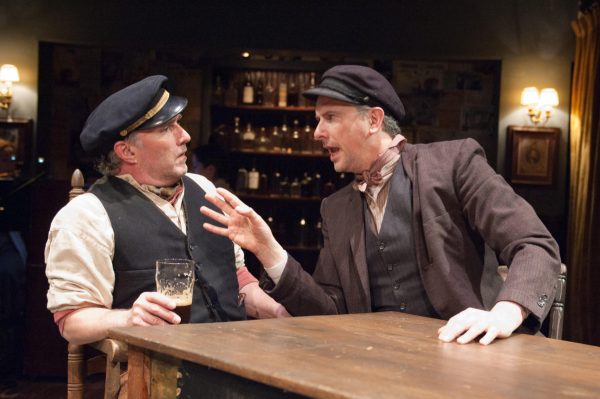Juno

(© Lara Goetsch)
It has been 55 years since the rarely produced musical Juno opened on Broadway, only to close after a scant 16 performances. It's not hard to see why Joseph Stein (book) and Marc Blitzstein's (music and lyrics) take on Sean O'Casey's 1924 drama Juno and the Paycock didn't thrive during the sunny optimism of the Eisenhower Era.
Set in 1921 Dublin, O'Casey's Ireland is not a place of optimism. There are no frolicking leprechauns and winsome lassies waxing whimsical about the loveliness of Glocca Morra. Juno, like the drama that inspired it, is set in a squalid Dublin tenement, a place of desperation, alcoholism, violence, and suffocating sexism. The only green in TimeLine Theatre Company's production isn't the emerald hue of a pastoral wonderland. It's the muddy, fading wallpaper of a home mired in hardship and dulled dreams.
As the titular matriarch, Marya Grandy ably captures the steel within a woman keeping home and hearth together with no help from her dissolute husband. No matter what Juno endures — and she endures a great deal during the two hours traffic on stage — she remains the personification of resilience. As for her husband, Jack (Ron Rains), he provides both a comic contrast to Juno's stoic strength and a swaggering portrait of the Irishman as an irrepressible, drunken ne'er-do-well. Chronically unemployed, Jack is unwilling to lift anything heavier than a pint. Rains mines Jack’s amiable worthlessness with just the right amount of preening self-importance and irresistible charm.
But it's not just an irresponsible spouse that Juno must contend with. The Boyle family also includes Johnny (Jonny Stein), an angry young man who has lost an arm to the ongoing violence with the British. Finally, there's the bookish, romantic Mary Boyle (Emily Glick), a young woman whose world is centered in her dreams of a better, bigger life. Reading, she explains to her mother in a memorably apt turn of phrase, means the difference between a life spent "staring at the wall and staring through an open window."
The plot kicks into gear with the arrival of Charlie Bentham (Peter Oyloe), a sharply dressed English barrister who brings the Boyles news of an unexpected windfall. The death of a cousin means a life-changing inheritance to the family and, for a while at least, it seems that the dull colors of Juno's world will blossom into a brighter life rich with comfort and security. And so it does, rather literally, as Juno promenades in a new, fancifully embellished bright yellow dress and urges visitors to have a seat on the crimson settee Jack has purchased.
As for Jack, he goes full peacock with the promise of a small fortune, strutting about in a custom-made suit and gentlemanly pince-nez while urging the neighbors to waltz to the music of a new fangled gramophone. Katie Spelman's emotionally rich choreography in the second act allows two numbers — "Johnny," and "The Liffey Waltz" — to succeed in enhancing and propelling the mood on stage rather than distracting from it.
But the jubilance of unexpected good fortune doesn't last for Juno and her family and it's not long before the Boyles are worse off than ever. In the production’s final, indelible moment, Juno stares down tragedy with an unshakable, gimlet-eyed refusal to be beaten.
Mirroring the action on the stage, John Culbert’s immersive scenic design transports the audience directly into the home of Jack and Juno Boyle, a sparely furnished place enveloped by battered wallpaper and devoid of any scrap of bright color. This is a household where eggs are a luxury.
But living within spitting distance of starvation isn't the worst of the troubles facing the (barely) working-class denizens in Juno. The British, brutally intent on quashing anyone agitating for an independent Ireland, are as potentially deadly as an empty larder.
Yet for all the troubles daily facing the Boyles and their neighbors, their world is as radiant with joy as it is with despair. The juxtaposition between those extremes lies near the heart of Juno. Stein and Blitzstein emphasize the coexistence of tears and triumph in the opening number, as director Nick Bowling's 16-member cast launches into the celebratory "I'm Alive." It's a number that ends in an execution but is nonetheless drenched in undaunted defiance. Musical director Doug Peck shapes the number beautifully, arcing through an operatic crescendo of vitality. The acoustics in TimeLine's space are an unexpected marvel; the cast's blend of lush, soaring sopranos and funereal basses resonate with the intensity of grand opera.
But despite its sonic beauty, Blitzstein’s score ultimately undermines the power of Juno. Peck’s musical direction is impeccable, and the blend the ensemble achieves is gorgeous. But that opening number aside, the show stops with each musical interlude, and not in a good way. Blitzstein’s songs don’t propel the story forward; they interrupt it. No matter how well the cast nails the complex harmonies and driving cadences, the songs halt the momentum of Stein's book. On its own, the music is thrilling. As part of a story, it's like weirdly-out-of-place punctuation.
Bowling culls marvelous performances from his entire cast, which is bolstered by strong supporting turns from Glick as the ever-yearning Mary and James Houton as Jack’s less-than-loyal drinking buddy. As fine as this production is, though, it’s tough not to imagine that the heartbreak and drama of Juno would be better served by a score woven into the plot, instead of one that seems to come from outside of it.










